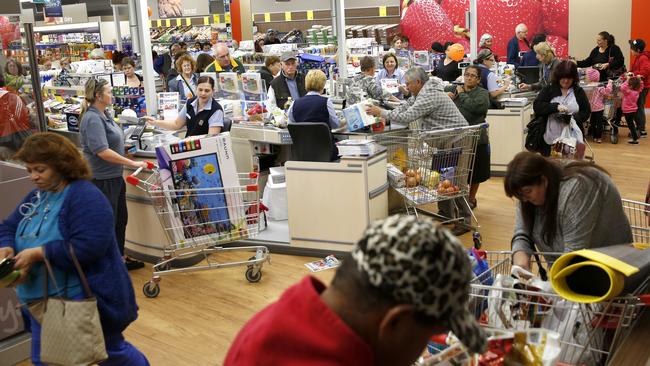Discounters Aldi and Costco challenge supermarket giants Coles, Woolies
For a generation of investors our supermarket “duopoly” — Coles and Woolworths — has delivered handsomely. But for how much longer?

It’s no secret ... smart investors settle on monopolies to make money. For a generation of investors our “duopoly” of two leading supermarket groups — Coles and Woolworths — has delivered handsomely. But for how much longer?
It seems like 2014 may be the crunch year for our two listed supermarket monsters — they have been threatened before but not in this way.
Low-costs retailers such as Aldi and Costco are not just competing with the incumbents, they are undermining them with a radically altered model.
At the same time there are constant allegations of sharp practices in the area. Indeed our primary competition regulator has not one but two court actions running against Coles for allegedly bullying suppliers.
But what is really chipping at the notion of the supermarket duopoly’s tight grip on customers and menacing grip on suppliers is the rise of these unlisted and nimble low-cost operators that have already won the battle in several overseas markets.
The new breed of cut-pride supermarkets are totally focused on cheap prices ... to the exclusion of almost everything else. What is more it has to be said they have arrived at the perfect time.
In Britain — a mirror image in many ways to the Australian supermarket landscape — the sector has literally cleaved into two between chains that service the new and emerging rich and those who do not fit in that category. Meanwhile, in the middle market the two giants, Sainsbury and Tesco, have hit hard times. Tesco has specific issues — allegedly overstating profits — but overall these two “high street” retailers have been left stranded between two ends of the market.
As always with monopolies — or duopolies for that matter — they are never much good for customers but are very good for shareholders. In Britain, with the Sainsbury and Tesco duopoly crumbling, the share prices of the chains have fallen by more than 40 per cent each.
Australian investors would be aghast to hear the British supermarkets now trade at roughly half the price-earnings ratio multiples of Coles and Woolworths. That is, the British chains are now on just nine times earnings while our stocks still trade as high as 17 times earnings.
Yet where is the growth in Australia going to come from at Coles and Woolworths? Aldi, which already runs more than 300 stores in the eastern states, earlier this month announced a major expansion plan into Western Australia and South Australia. The US-owned Costco is also making inroads, though its ambitions appear limited to a handful of very large outlets
As for Coles or a Woolworths expanding offshore, they have not made any serious effort to get overseas revenues — even Tesco for all its faults runs 2000 stores across Asia, though they may now have to be sold to keep the British ship afloat.
Worst still for local Australian investors, supermarket stocks do not offer the consolation of high yield you expect from similarly dominant players in other sectors such as the big four banks and Telstra.
Wesfarmers, the parent company of Coles, currently yields about 5 per cent and Woolworths trails behind with roughly 4 per cent — against the 6 per cent available at the banks or A-REITs and the pressure is clearly rising on the supermarkets to find growth.
Perhaps the answer may have been to risk cannibalisation and take on Aldi at their own game as Qantas has tried in airlines with Jetstar, but it is probably too late.
As UBS analyst Ben Gilbert wrote last month before the full impact of the Tesco accounting scandal became clear: “Aldi and Costco are very hard for traditional supermarkets to compete with — we are becoming more concerned about the threat these discounters present to both sales and margins.”
The worst thing for investors of course is that you can’t buy shares in Aldi or Costco on the ASX if you wanted to keep up with the trends. Groups such as Metcash or other “independent” operators will find it even harder to compete because they lack the pricing power. It’s a seriously challenging outlook for supermarkets — and no obvious way out of a storm that looks like it’s coming our way.
Trial Eureka Report FREE for 21 days. register now at www.eurekareport.com.au



